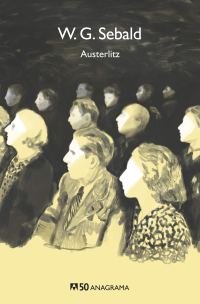
Review of the book «Austerlitz» by WG Sebald.
“Austerlitz” is a novel by the German writer WG Sebald, published in 2001. The work tells the story of Jacques Austerlitz, an art historian who lives in London and who, after years of researching the origin of his family and his own identity, he discovers that he is the son of Jewish parents who died during the Holocaust.
Austerlitz, by WG Sebald, is a novel that explores the traces of the past in the memory and identity of a man who feels alien to the world. The protagonist, Jacques Austerlitz, is a Jewish boy who was sent to Wales during World War II to escape Nazi persecution. There he was adopted by an elderly couple who hid his true origins from him and changed his name. Years later, now an adult and a professor of art history in London, Austerlitz begins to reconstruct his personal history through chance encounters with the narrator, a writer who meets him at the Antwerp station and who becomes his confidant. he.
The novel develops in the form of an internal monologue, in which Austerlitz recounts his memories, his travels and his investigations into his past. The author uses a poetic and melancholic style, with long and complex phrases that reflect the character’s flow of consciousness. In addition, he incorporates photographs, drawings and documents that give the work a documentary and testimonial character. Sebald addresses themes such as exile, trauma, loss and oblivion, as well as the history of Europe in the 20th century, marked by violence and barbarism. Austerlitz is a novel that questions the limits between fiction and reality, between memory and imagination, and that invites us to reflect on our own identity and our place in the world.
The novel is presented as a mixture of genres, combining elements of fictional narrative with autobiography, essay and history. Sebald’s writing style is known for his ability to weave different stories, images and reflections into a single work, creating a unique and deeply evocative literary experience.
The novel is divided into four sections, each presenting different aspects of Austerlitz’s life and his search for his past. The first section tells of his meeting the narrator at a train station in Antwerp, Belgium, and their subsequent friendship. The second section recounts his childhood, raised by adoptive parents in Wales, and his education at different boarding schools. The third section presents his research into the architecture and history of railways in Europe, and the fourth section recounts his trip to Prague and his discovery of his Jewish origins.
One of the most notable aspects of “Austerlitz” is its deep analysis of memory, identity and history. Sebald explores the ways in which the past influences the present and how personal and collective history intertwine in the lives of Austerlitz and the characters around him. The novel also reflects on the way in which collective traumas, such as the Holocaust, continue to have an impact on society today and on the way we remember and relate to the past.
Sebald’s prose is exceptionally poetic and evocative, using detailed and descriptive prose to create a melancholic and nostalgic atmosphere that evokes the feeling of being trapped in a world that no longer exists. The images and descriptions in “Austerlitz” are full of details and historical information, and the novel is packed with references to literature, music and art, giving it a depth and richness that can be seen on every page.
In conclusion, “Austerlitz” is a literary masterpiece that reflects on deep and universal themes such as identity, memory and history. Sebald’s poetic and evocative prose creates a melancholic and nostalgic atmosphere that invites us to reflect on our own lives and our own connections with the past. A deeply moving and inspiring novel that will remain relevant for many years to come.
Source: https://algunoslibrosbuenos.com/austerlitz


